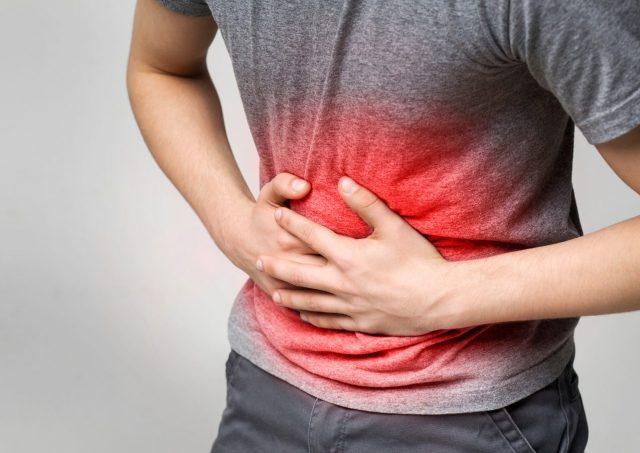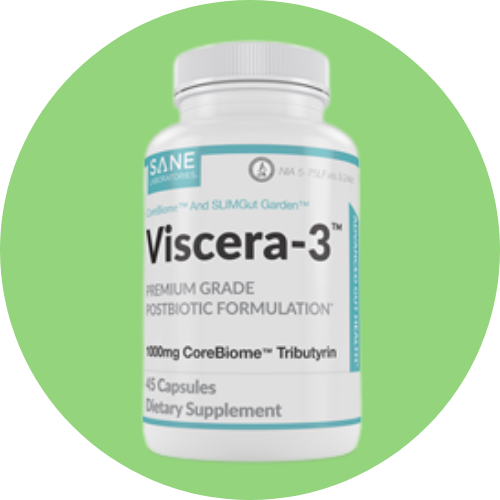How To Get Rid of Trapped Gas: Complete Guide 2024
By Vanessa Richards
January 10, 2024 • Fact checked by Dumb Little Man

Whether there is a health-related issue or you simply cannot pass gas in a public space, the truth is it will keep building up and become more and more uncomfortable with every minute.
In the worst cases, trapped gas may feel like stabbing pain. The pain can go up from the belly and even reach the abdomen or chest.
Believe it or not, some people experience such severe gas pains that they associate trapped gas with a heart attack or even appendicitis. The first thing they do is reach the emergency room.
Producing and passing gas is just part of the digestive process and slight problems can be easily overcome if you know what to do. Here is how to get rid of trapped gas and gas pain.
How to get rid of trapped gas: Symptoms

Overall feeling of discomfort
Trapped gas will make it fairly obvious, and symptoms just cannot be missed. Generally speaking, intestinal gas will give you an overall feeling of discomfort, especially if you find yourself unable to relieve gas, which will be trapped in the digestive tract.
Sometimes, having people around you is the only reason you cannot do it. Other times, it could be the symptom of a more problematic situation that needs treatment – such as irritable bowel syndrome, which is quite common.
All in all, passing gas – or the necessity of passing gas – is a primary symptom of trapped gas. Get rid of gas by letting it. Excess gas can also go up the digestive tract and cause symptoms like burping – if you burp out of nowhere, chances are you have some gas trapped inside.
Abdominal pain
Too much air inside will inevitably lead to painful discomfort. Holding it for too long will cause mild pains at first, but they can become quite severe – abdominal pain, for example. Cramps will also kick in at some point, not to mention the knotted sensation in the abdomen.
Feeling of pressure
Later on, a feeling of pressure in the abs may also indicate trapped gas–bloating sensations. You need to pass gas to relieve gas pain. Gas relief may sometimes be impossible when bloated – even if you try to get rid of it.
Finally, the more bloated you are, the more you will swell. You will notice a visible increase in the size of your belly – known as distention. Mixed with all the other symptoms, this issue can be extremely uncomfortable, hence the necessity to go for gas relief.
Now, some of these signs could be normal at times and may not always indicate a problem – you could feel perfectly fine. For example, it is normal to burp after eating certain foods. Food dairy and digestive enzymes do not always react well, just to give you an example.
The same rule applies when passing gas – have lots of beans, and chances are you will pass plenty of gas. This is just how the digestive system works. To help you determine whether or not you have gas trapped inside, keep in mind that most people pass gas more than 20 times a day.
What causes trapped gas?

Passing gas is normal. The issue is often caused by swallowing air while eating something or having a drink. Plenty of stomach gas is released when you burp, but sometimes, it can also go the other way.
Other than that, people pass gas because of the digestive process too. Gas is produced in the large intestine when bacteria work on carbs from your diet. Bacteria will have some of this gas, but the leftover has to be released through the anus.
Some foods are more likely than others to cause gas. You may struggle to release trapped gas if you eat fiber-rich foods. Fibers are mandatory for good digestion, but they also cause gas. Some popular foods that cause gas include fruits, vegetables, beans, whole grains, and peas.
More dietary factors can underline the necessity of a heating pad, activated charcoal, peppermint oil, apple cider vinegar, or other remedies to pass gas. You will get more gas if you drink carbonated beverages like beer or soda.
Your eating habits can also cause stomach gas. People who eat too quickly may end up with gas due to the high amounts of air they swallow. Chewing gum or drinking through a straw can cause similar issues in the long run.
Fiber foods can cause gas, but the same rule applies to fiber supplements, which will naturally increase colon gas. Finally, it is worth considering all the sugar substitutes – from sorbitol to xylitol. They can also get gas trapped inside the body.
There are a bunch of health conditions that can lead to the impossibility of releasing gas.
Excessive gas can be caused by chronic intestinal affections. Crohn’s disease is one of them, not to mention colitis or diverticulitis. Then, too many bowel bacteria may have similar effects. Apart from causing too much gas and stomach pain, bacteria may also cause diarrhea and even weight loss.
You can try to alleviate gas by checking for a potential food intolerance too. Lots of people have no clue about particular allergies. If the digestive system cannot break down particular foods, they will cause bloating sensations.
Last but not least, chronic or acute constipation may lead to painful gas too. Constipation can be healed naturally or with an over-the-counter remedy. Make sure you discuss it with your doctor if you are not sure how to avoid gas pain.
>>Related Article: The Complete Guide to Gut Cleanse 2024
How to get rid of trapped gas?
Now that you know how hot air or foods can cause abdominal bloating, what are the best options to overcome this problem? Some people stick to the natural approach – a few yoga poses or perhaps a hot water bottle and peppermint tea.
In more severe cases, you may need to deal with medications, not to mention potential supplements and programs that can help you overcome trapped gas – whether it is caused by lactose intolerance or a specific condition.
Natural remedies
The natural approach will be a doctor’s first recommendation when trying to get rid of trapped gas. Fortunately, there are a few lifestyle changes you can make to improve that, yet it may take a few weeks to notice results.
Dietary changes
Try to limit the consumption of fried foods, artificial sweeteners, garlic, onions, foods rich in fats, dairy products, prunes, and cruciferous vegetables. Keep in mind that you do not necessarily need to avoid them, but just have them in lower quantities.
Keep a food diary to figure out what causes the trouble. Note what you eat and try to slowly eliminate one food at a time, then observe the symptoms over a week. This way, you can tell precisely which food is the culprit.
Discovering food sensitivity can reduce bloating – a normal part of your diet right now.
Take a walk
Second, you may need to move around. Take a walk. If you feel bloated and it seems like you have more air inside than normal, you will need to exercise more. As a quick relief option, simply take a walk.
Massage
If you swallow air and end up bloated or with trapped gas, chances are it will become painful if you cannot pass it. A quick relief option implies massaging the painful spot – give it a mild and gentle massage, it might help.
Yoga
Certain yoga poses can also relieve bloating and reduce gas. There are more poses to aid digestion. The simplest one implies being on your back. Extend the legs and keep them straight – one close to the other. Bend the knees and bring them a bit closer to your chest, then get your arms around them.
Pull the knees as close as possible to the chest. You can also pull the head up – or simply keep it on the floor, whatever feels comfortable. Hold this pose for around half a minute. You may feel a sharp pain if you hold the gas inside for too long.
Avoid carbonated drinks
According to peer-reviewed studies, noncarbonated liquids will, indeed, help. Stick to herbal teas – some people can do with warm water only. As for flavors, go for chamomile, ginger, or peppermint. It makes no difference if you use teabags or dried plants.
Talking about herbs, apart from chamomile tea, you can also try caraway, fennel, anise, coriander, and turmeric. Simply implement these herbs into your diet – you can also go for seeds. They can go in your recipes or your smoothies. In the long run, they can prevent you from reaching the emergency room.
Bicarbonate of soda and apple cider vinegar is just as useful. Bicarbonate of soda can be dissolved into water, while apple cider vinegar can be taken in the same way. According to the Cleveland Clinic, there are not many studies regarding herbal remedies, but they are believed to help.
Clove oil
Finally, clove oil may also help against this medical condition.
Apart from all these, you can help the bowel movement and digestive process with charcoal supplements and probiotic supplements. Avoid chewing gum, find a herbal tea that works, and you may never need any OTC remedies.
Medications
OTC treatment options
These represent a good choice when the natural approach fails to help. Assuming you already have a healthy diet and you have tried everything, here are a few other options you can get from a local pharmacy.
Enzyme preparations
It can help – for instance, products for lactose intolerance. Alpha-galactosidase, for instance, is an enzyme that will stop legumes from producing gas. Such supplements are often taken for prevention, but they can also help if you already have trapped gas.
They come under more brand names.
Adsorbents
According to the Massachusetts General Hospital, the average person may also benefit from adsorbents. Such products work wonders because they break up bubbles making up gas. They are often based on activated charcoal and can come in powders, capsules, or tablets.
The charcoal may also have unwanted adverse reactions, such as turning your stools black.
Supplements
Supplements are not to be overlooked either. Apart from natural lifestyle changes and a few OTC remedies, you can take supplements for long-term well-being, without really having to worry about side effects – make sure they are natural, though. Here are some of the top remedies out there.
4 Best Supplements to Ease Gas Pain
| Product | Key Feature |
|---|---|
| Top Consumer's Choice | |
| Best Prebiotic Fiber Blend | |
| Best Value Supplement | |
| Best for Probiotic Weight Loss |
1. Top Consumer's Choice: Synogut
Dietary Synogut supplements boost the natural health of your digestive system and even include good bacteria to overcome the problematic ones. Ingredients are 100% natural.
Shop at Synogut's Official Website.
Full Article: SynoGut Reviews: Does it Really Work?
2. Best Prebiotic Fiber Blend: Sane Viscera-3
The Sane Viscera-3 probiotic supplement boosts gut health and helps the body maintain bacteria in a perfect balance. You can prevent gas from getting trapped, as well as smelly feces. It has an incredibly good reputation, which pretty much guarantees it.
Shop at Viscera-3's Official Website
Full Article: Viscera 3 Reviews: Does it Really Work?
3. Best Value Supplement: FloraSpring
The low price of the FloraSpring supplement is what draws most of its popularity. It is also quite effective because it is rich in probiotics, which help regulate weight and boost the digestive process.
Shop at FloraSpring's Official Website
Full Article: FloraSpring Probiotic Review: Does it Really Work for Weight Loss?
4. Best for Probiotic Weight Loss: BioFit
The Biofit supplement ensures you can eat your favorite foods and still break them down without experiencing trapped gas and bloating sensations. It helps regulate the weight too.
Shop at Biofit's Official Website
Full Article: BioFit Reviews: Does it Really Work?
Final words
Learning how to get rid of trapped gas is not as difficult as it may seem. Pretty much everyone experiences such problems every once in a while, but they usually go without any treatment at all. The necessity of treatment becomes more obvious when the problem persists.
The natural approach is your top recommendation. OTC remedies could help too, but they may also have side effects. Stick to natural supplements instead, and while the list is longer, Synogut easily stands out.
Its ingredients are proven to activate the gut, which will smooth the digestion, give you perfect stools and prevent gas from getting trapped inside.
Synogut is your safest bet. Its general role is to keep the gut in perfect health condition, which will also ensure flawless digestion.
Click here to get Synogut at a Discounted Price
How to get rid of trapped gas FAQs
When should I see a doctor for trapped gas?
See a doctor if you experience weight loss, changes in bowel movement, blood in the stool, diarrhea, vomiting, appetite loss, constipation, or heartburn. The same rule applies if trapped gas causes severe pain.
Can trapped gas be serious?
Trapped gas is not always serious. In most cases, the issue is mild and can get away easily. However, there are times when failing to relieve gas can cause severe painful sensations that may interact with your day-by-day activities. Some symptoms can define a different condition and may need a doctor's advice.
How do I know if my gas pain is serious?
General discomfort occurs now and then – it is perfectly normal. Bloating sensations can also be quite common. However, excessive gas can give you some warnings, especially if you also have abdominal pains, constant bloating, weight loss issues, or nausea. The issue could be more serious then.
Vanessa Richards
Vanessa is a mom of 3 lovely children and a software geek. Outside of her career as a health and wellness instructor. She enjoys writing and researching on topics such as finance, software, health and culinary.





